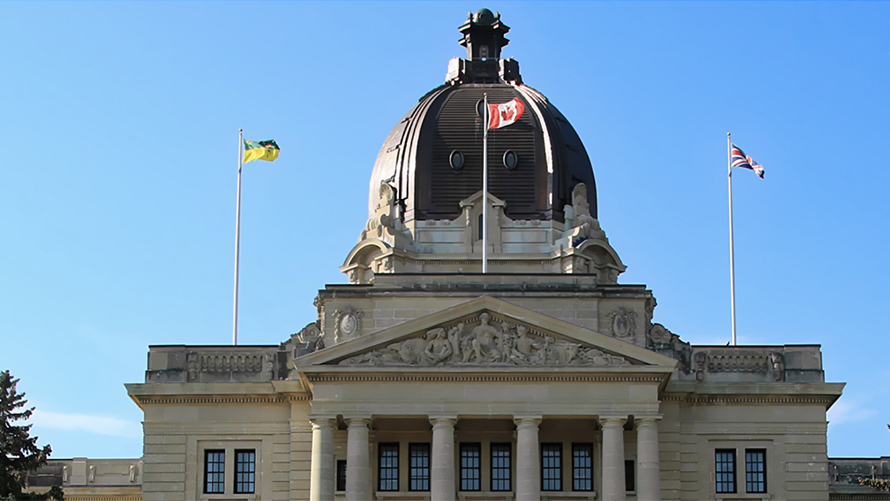With candidates now officially hitting the campaign trail for an Oct. 26 provincial election, a Catholic Action campaign examining Saskatchewan election issues and party platforms from the perspective of Catholic Social Teaching is also underway.
Online resources have been posted and planning is in the works for a proposed webinar during the election campaign featuring interviews of representatives of each provincial political party about issues of importance to Catholic voters.
Organized by the Canadian non-profit organization Catholic Conscience, the non-partisan Catholic Action campaign has been developed with support from Saskatchewan’s Catholic dioceses and eparchy, including input from the five Saskatchewan bishops.
Developing reflection and discernment materials for the provincial election in Saskatchewan is a follow-up to the first Catholic Action campaign organized by Catholic Conscience for the federal election in the fall of 2019.
That federal awareness and discernment campaign included a range of resource materials such as “Conscience Cards” (one-page briefs on themes of Catholic Social Teaching and its relation to relevant election issues), party platform comparisons from the perspective of Catholic teaching, as well as prayers and reflections.
Matthew Marquardt, president and founder of Catholic Conscience, and executive director Brendan Steven have worked with representatives of the Catholic dioceses in the province in developing the materials for the latest Catholic Action campaign.
“We’re excited to be bringing Catholic Action to Saskatchewan, to help Saskatchewan Catholic voters prayerfully and thoughtfully discern their vote in this provincial election,” states a recent message set to Catholic Conscience supporters.
“Partnering with Catholic Conscience has been essential in the development of this provincial resource,” says Myron Rogal, coordinator of justice and peace in the Diocese of Saskatoon. “Their commitment and integrity in focusing on the centrality of what the Church teaches will assist in giving Catholics a credible voice in the public sphere.”
Rogal adds that Catholic Conscience’s non-partisan, broad approach, grounded in Church teaching makes their materials particularly helpful.
“Although there are many other fine voters’ guides available that touch on particular components of Catholic Social Teaching, the unique feature of this approach is that it focuses on the entirety of what the Church has taught throughout the ages about upholding the dignity of the human person without compromise.”
According to Catholic Conscience materials, those important Catholic teachings include “the sanctity of life and human dignity; the common good, including the health of our planet and our environment; solidarity, or the principle that what happens to others affects us as well; and subsidiarity – the principle that individuals should be left to make decisions for themselves, whenever it’s responsible for them to do so.”
The encouragement and united support that the Catholic bishops of Saskatchewan have given to this initiative during the provincial election campaign offers an important message, notes Rogal. “It is a sign to the faithful that political participation is not an ‘extra’ to living out our faith, but a necessary part.”
Voting is a step in living out the Christian call to work for the common good, Rogal said.
“Catholic Social Teaching gives us a sobering reminder that we are called firstly to focus on our faith above any narrow ideological leanings that may hold us captive.”
“Voting from a Catholic perspective furthermore asks us to rise above the rhetorical noise of political soundbites and to enter into constructive dialogue with our brothers and sisters in Christ,” Rogal adds, noting that following up respectfully with politicians of all stripes is continuous process of engagement.
That ongoing process of political engagement is also addressed in the Catholic Conscience document Tough Calls: Discerning your vote as a Catholic. The document proposes four steps for voters, namely: “1. Inform ourselves responsibly concerning (a) the teachings of the Church and (b) issues relevant to the election; 2. Reflect prayerfully; 3. Choose confidently; and 4. Once the election is over, stay actively and respectfully engaged with those who have been elected – whether they are our own preferred candidates or not. This is important if we hope to improve the system.”
The document goes on to say: “Even when choices seem clear, we should neither ignore the process nor skip steps: we Catholics have both a civic duty to stay informed and a calling to seek God’s help in choosing. Nor can we responsibly abstain, except in extreme and very clear-cut circumstances. If we don’t vote, and don’t stay engaged, how can we hope to improve things? And how, when we face judgment, will we explain the fact that we failed to do what we could to help build a world pleasing to God?”

